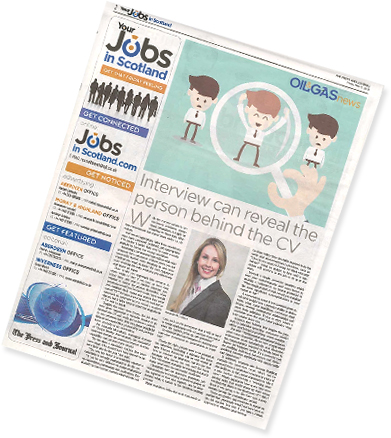Look Beyond The CV
6th May 2016
With the current excess in immediately available, exceptional job seekers it might be tempting to think that effective recruitment has never been easier in Aberdeen.
But record application rates from candidates who have prepared polished, job appropriate CVs makes it easier than ever to make a costly mistake by hiring the wrong candidate.
Assuming a permanent hire will be with your company for a minimum of 3 years', you are essentially tasked with deciding in one hour whether you want to spend the next chapter of your working life with someone you effectively only know on paper.
How would you approach this scenario in other walks of life? If you had an hour long blind date and had to decide whether you wanted to marry the person thereafter, what questions would you be sure to ask? How would you establish their values and ensure they were a good 'fit'? Perhaps in retrospect it's best not to approach an interview as you would a candlelit dinner, but it helps keep in mind the magnitude of the task in hand!
Despite the short time frame, the job interview gives employers a valuable chance to go beyond the CV and really get to know a person. In one precious hour they can glean insightful data about capabilities, personality and perhaps most crucially of all, motivation.
For Amanda McCulloch, Managing Director of Thorpe Molloy Recruitment, the successful interview focuses on questions beyond obvious capability and proven track record, "By the time a candidate reaches first interview stage CVs should have been filtered to ensure they can do the job. The next key factor is to establish whether a candidate is actually motivated to do the job."

She continues, "It can be very difficult to make evaluations on capabilities, personality and motivation. Particularly in the current market where emotional cues, such as the perception that it will be hard to retain applicants with oil and gas experience when the market picks up, are prevalent."
So what are the top strategies for making your interview techniques as quantifiable as possible?
Firstly, the right people need to be present at the interview, including a relevant line manager. Human Resources will be well versed in how to conduct an interview but it's the line manager who knows the role and the team. They will almost certainly be working at a much closer level with the successful candidate.
Checklists and set interview questions provide guidance but sticking to them as gospel, at the expense of flow and rapport, can be detrimental when it comes to the decision making process.
Many recruiters define the work that needs to be done rather than the skills required to do the work and unconventional questions, such as 'How do you empty a Boeing 747 filled with jelly babies?' bring no insight to how well a candidate will perform in the job or fit in to the team.
Instead, a single, powerful question which tests past achievements and contributes to making a judgment on future potential is "What single project or task would you consider the most significant accomplishment in your career so far?"
A conversation around this question gives invaluable insight into a person's ability to define tasks, plan, meet deadlines, overcome challenges, develop professional relationships and learn from mistakes. Trying to elicit where a candidate goes the extra miles indicates what truly makes them tick.
Amanda McCulloch also believes that despite the pressure to minimise spending, companies should utilise psychological profiling where possible, she says: "Psychometric assessment helps explore team dynamics, shows how people could collaborate more successfully, and illustrates the characteristics required to elevate teams to higher performance levels. It's a powerful tool for profiling individual behaviours and distinguishing between applicants with similar skills and experience."
In addition Amanda also favours thinking outside the interview room. Much can be gleaned from a candidate's reaction to a tour of the facilities. In fact some organisations take it a step further conducting a 'working interview'. Where applicants have spent time completing tasks that would make up their actual working day there is less likelihood of "I didn't think it was going to be like this" type conversations during the probationary period.
There are golden opportunities to secure expertise that previously would not have been on the job market, but only if you take a robust approach to effective interviewing.










